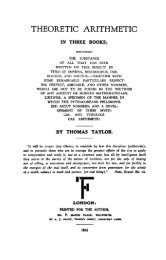The Mystical Hymns of Orpheus - Platonic Philosophy
The Mystical Hymns of Orpheus - Platonic Philosophy
The Mystical Hymns of Orpheus - Platonic Philosophy
You also want an ePaper? Increase the reach of your titles
YUMPU automatically turns print PDFs into web optimized ePapers that Google loves.
OF ORPHEUS.<br />
Gymnastic virgin <strong>of</strong> terrific mind,<br />
Dire Gorgon's bane, unmarried, blessed, kind :<br />
Mother <strong>of</strong> arts, impetuous ; understood<br />
As fury by the bad, but wisdom by the good.<br />
Female and male, the arts <strong>of</strong> war are thine,<br />
0 much-form'd, dragoness 60, inspir'd, divine :<br />
O'er the Phlegrean giants61, rous'd to ire,<br />
Thy coursers driving with destruction dire.<br />
7 8~ ~LEQOTTS, $JUX~] apX(K?)* 1] 8~ ~TE~UTW~~S, ape71 ap)(tKv.<br />
i. e. " Of the zoogonic principles, the summit is called<br />
Hecate ; the middle, ~uling Soul ; and the extremity, ruling<br />
Virtue." <strong>The</strong> supermundane order is also called by Proclus<br />
apxttcq, because the divinities <strong>of</strong> which it consists are<br />
principles and rulers.<br />
<strong>The</strong> reason, therefore, is obvious why Minerva in this<br />
hymn is said to delight in caves, rocks, groves, and shady<br />
mountaias ; for this arises from her union with Diana,. And<br />
hence it appears, that Runkenius was mistaken in asserting<br />
that these epithets were misplaced. We may likewise<br />
hence see the reason why, in line thirteen, Minerva is<br />
called "female and male," as well as the Moon ; and why<br />
the Moon in the hymn to her is called aavco$e ~ovpq, " allwise<br />
virgin."<br />
It is easy to perceive the agreement between Minerva,<br />
who is characterized by divine wisdom and providence, and<br />
a dragon ; since, according to Phurnutus, a dragon is <strong>of</strong> a<br />
vigilant and guardian nature.<br />
As the fable <strong>of</strong> the giants is well known, but its real<br />
meaning is known only to a few, the following explanation<br />
<strong>of</strong> the battles <strong>of</strong> the Gods is inserted from p. 373 <strong>of</strong> the<br />
Fragments <strong>of</strong> the Commentary <strong>of</strong> Proclus on the Republic<br />
<strong>of</strong> Plato : 1L <strong>The</strong> divided progressions <strong>of</strong> all things and their

















